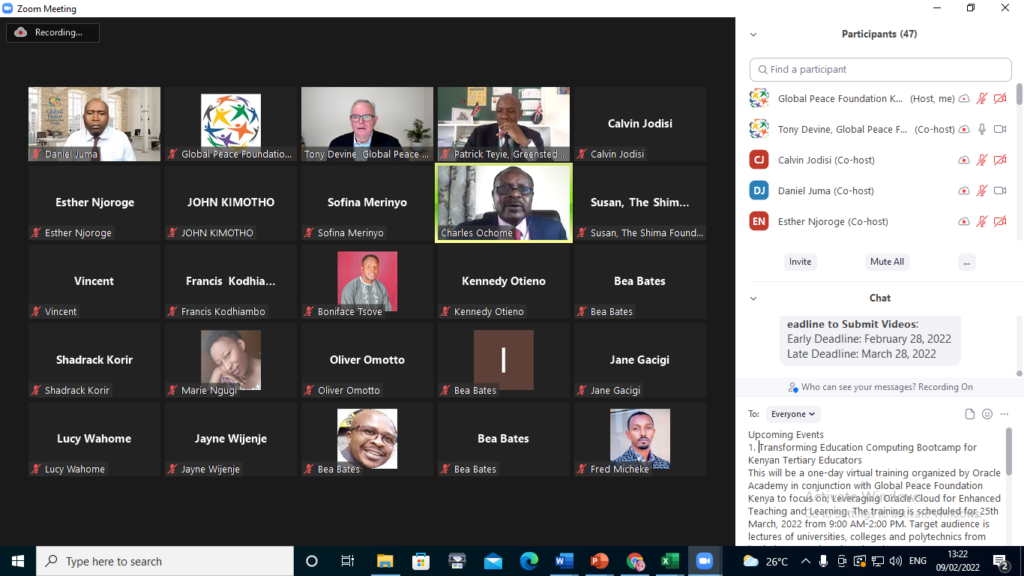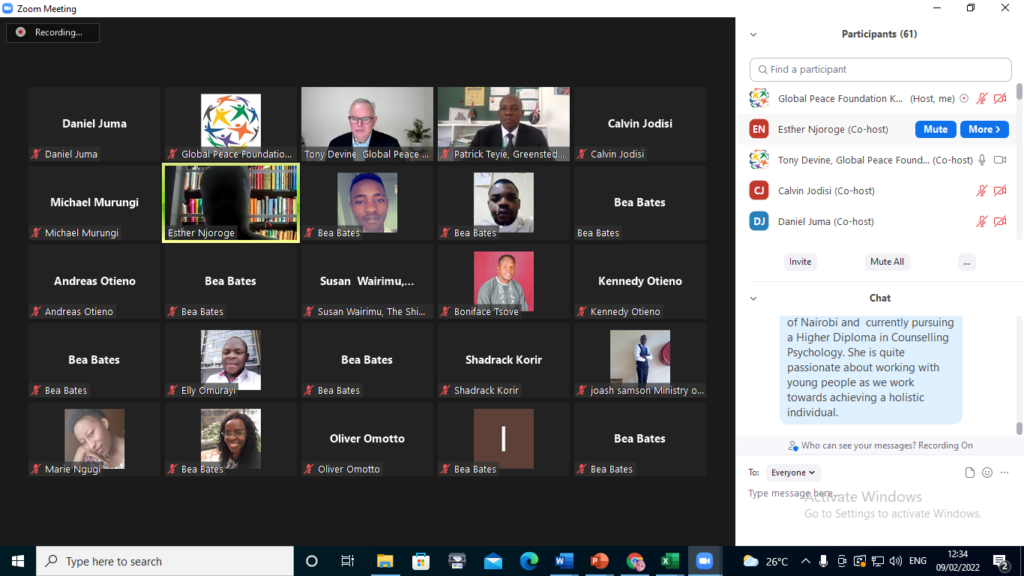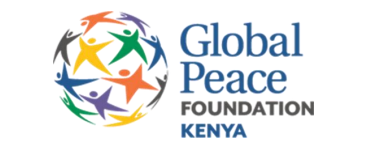Quality education remains a key changemaker in realizing sustainable development and a peaceful world. Different countries across the globe today faces problems such as; climate change, Covid-19 pandemic, food insecurity and inequality which are threating our ways of living.
To build a more developed society, blended with peaceful co-existence, innovation and use of technological advancements would ideally help the world adjust to challenges and give solutions to problems affecting mankind.
This is however achievable only through embracing quality education as a pillar that triggers development in a society that acknowledges the desire to foster peace.
It is in this regard that the Global Peace Foundation Kenya and its partners hosted a webinar under the theme; “Reimaging Education for Peace and Development,” in line with the United Nations International Day of Education 2022, to critically discuss and give recommendations on how education in Kenya can bring development and a peaceful country.
The discussion which brought together panelists from different fields within the education sector, focused on school-based approaches and out of school initiatives that can mold learners to be innovators, peace ambassadors and entrepreneurs to make a better society for generations to come.

In his opening remarks during the session, Mr. Daniel Juma Omondi-Executive Director-Global Peace Foundation Kenya, appreciated the panelists for creating time for the discussion, elaborating on how Global Peace Foundation uses education to promote peace and development.
Speaking during the webinar, Mr. Michael Murungi-Government Affairs & Public Policy Lead-Eastern Africa- Google, addressed the issue of child online safety, dissemination of education curriculum content online and the key role that the company takes in supporting quality education not only in Kenya but also across the globe.
On his part, Mr. John G. Kimotho, Director-Education Media-Kenya Institute of Curriculum Development (KICD), gave a breakdown on how the curriculum used in the country today has been segmented to factor in the need for learners to be fully informed about peace initiatives, promotion of culture and diversity while appreciating an inclusive education.
“The way learning activities are carried out in our schools encourages learners to consult each other and hold group discussions that proves nobody can exist alone. The curriculum from KICD requires teachers to fully engage the learners in peace clubs and campaigns which we fully support,” Mr. Kimotho said.

On the same line, Mr. Patrick Teyie, Headmaster, Greensteds International School, gave his insight on the aspect of how schools can create a conducive learning environment that enhances democracy, respect, experiential learning and tolerance.
“The training that the teachers undergo should be able to equip them with skills on active learning, experiential learning and reflective practices,” stressed Mr. Patrick.
As a way of creating a learning environment that gives equal opportunity to all learners, Ms. Sofina Merinyo-Technical Project Lead-The Shima Foundation, expressed her desire to see education system that is devoid of favoritism and that values all learners irrespective of their cultural background, financial challenges and gender.
“As a society, I think its high time that we come together and address the issue of inequality in the education sector that favours one gender over the other,” lamented Ms. Sofina. The insecurity, infrastructure, indiscipline and unrests in our schools was addressed by Mr. Charles Ochome-Chairman-Kenya Private Schools Association who encouraged the government and policy makers to always give priority to safety of learners especially when constructing learning institutions.
“I want to say that most of the insecurity problems we have seen in our schools arise from inadequate fulfilment of safety requirements as per the government’s policies,” said Ochome.
Concurrently, Ms. Esther Njoroge-English and Literature Teacher-Alliance High School, agreed that the safetyof learners must start by learning institutions adhering to government policies but stressed on the need for the learners themselves to embrace a peaceful learning environment.
“The culture of being disciplined, patriotic and giving room for dialogue should be the best ways that learners can use to air their grievances to the management of the schools,” explained Esther.
The moderator of the session Dr. Tony Devine-Vice President Education-Global Peace Foundation, took the panelists through the questions arising from the participants.
In conclusion, the International Day of Education webinar was a reflection of numerous education-based programs that Global Peace Foundation campaigns for as tools of promoting peace and development.
